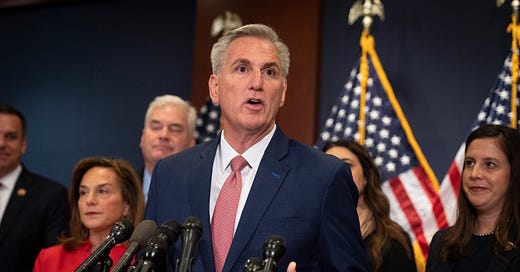On "Debt Ceiling Drama”, Media Promote Tiresome ‘Clowns in Congress’ Trope
Many bad things Congress does are bipartisan, but threatening to tank the economy in order to gut the liberal state is almost entirely Republican cruelty. Our media should explicitly say so.
With a brief exception in the late 1990s/early 2000s, every poll for the past 50 years on the subject shows that Americans disapprove of “Congress,” a somewhat abstract political body that seems to most Americans like an ineffectual and corrupt institution. Like railing against “the swamp” or “Washington,” politicians always run in opposition to it because it’s specific enough to hate, but generic enough that it can represent whatever one wants it to. Somewhat paradoxically, polls show Americans overwhelmingly like their specific congressperson (by definition, in general, this has to be true), but they despise the House and Senate as such.
It’s such a ubiquitous cliche that the Simpsons did a throwaway gag mocking it almost 30 years ago, showing an automated DJ making this banal observation:
Thus framing problems that ostensibly arise from “Congress” as the fault of Congress (or “the Senate” or “House,” as it happens) fuels this type of brainless, unspecified political hatred. And it’s true, a lot of the bad things that Congress does are bipartisan: rubber-stamping Pentagon budgets, launching wars, sanctioning poor countries, and promoting austerity politics. Yet many bad things “Congress” gets blamed for are not bipartisan, but entirely manufactured by one party: the Republicans.
Such is the case with these extortionist, cynical “debt ceiling crisis” we have every few years. While the details of each vary, the basic idea is the same: Republicans control the purse and want to use that control to defund elements of the liberal state they don’t like under the phony auspices of “concerns” over the debt and/or deficit. As I wrote in 2017 for The Nation, these concerns are—of course—not genuine, and are merely a way of circumventing the will of voters by selectively hacking away elements of social welfare while bloating the military budget. While this particular “show down” didn’t result in a “shutdown,” the underlying problem of our media framing these biannual shakedowns as the product of some type of existential dysfunction with “Congress” rather than a cynical ploy by Republicans continues unabated.
While the text of these articles is often more inculpatory to the GOP, the framing and headlines continue to push this idea that the latest “crisis” is bipartisan in nature. Take this May 30 editorial by The New York Times, that frames the issue as a failure of “Congress”:
Pass the Debt Limit Deal. Then Figure Out How to End the Drama.
Biden’s deal with Republicans would avoid default and deserves support, but Congress was reckless in allowing this standoff to happen again.
“Congress” did what? Congress didn’t “allow” the standoff to happen; Republicans won the House of Representatives last November, and the second they did they threatened default unless Biden and House Democrats gutted some arbitrary percent of social welfare and expanded the military state even further. (Though it should be noted that Biden himself has been a proponent of astonishing military spending.)
Then we have dozens of headlines treating this like a tween social media feud. “Debt ceiling drama heads down to the wire in the Senate,” ABC News tells us. “The debt ceiling drama may feel like it’s over, but it may have only just begun,” CNN adds. “That's a debt drama wrap,” Washington Post blithely concludes.
It’s not an agency-free “drama.” It’s one party using the threat of economic ruin to legislate austerity regimes it couldn’t win at the polls. It’s a shakedown by Republicans. It’s a totally unnecessary and artificial crisis one party creates out of thin air every few years to achieve their narrow, unpopular ideological aims. Why are we not calling it this? Why is this not how it’s framed? Why is it this generalized, generic, unspecified “drama” that “Congress” does every odd year?
Every headline describing the “drama” should be some variation on “Congressional Republicans’ Threats to Tank Economy Come to an End”. But it’s not, because this would be too unseemly. So, instead, we get these responsibility-flattening non-statements about failures of “Congress.”
This isn’t to excuse Democratic capitulation to anti-poor austerity—Biden’s triumphant speech upon signing the bill bordered on co-conspiracy, But caving in the face of crisis, and contriving the crisis in the first place, are not the same thing. And to the extent the “Clowns in Congress” frame is evoked, it’s not to lambast conservative Democrats for working with Republicans to harm the poor—it’s to scold them for not doing so quickly enough, or in a more extreme way.
Indeed, one reason for this constant obscuring of responsibility is that while major media outlets don’t want to actually a default on debt and tanking of the economy, they likely welcome the threat of this every few years to put the greedy welfare state back in its place. They like Republicans checking the “excesses” of Democrats, especially “post-Covid” benefits. And if they described it as a far-right shakedown, this may re-orient public sympathies with the side not doing the pointless extortion, and we certainly can’t have this. This would be too partisan, too biased, too one sided.
Instead we get this generic, faux-populist mockery of “Congress,” which we are told is dysfunctional in some unspecified, nonpartisan way, sowing cynicism in the least productive way possible. Again, there are plenty of bad, unpopular things both parties do. But these cruel, pointless “debt ceiling” spectacles we get every time Republicans win the House are not one of them. It’s a GOP contrived crisis, and it should be framed this way.



